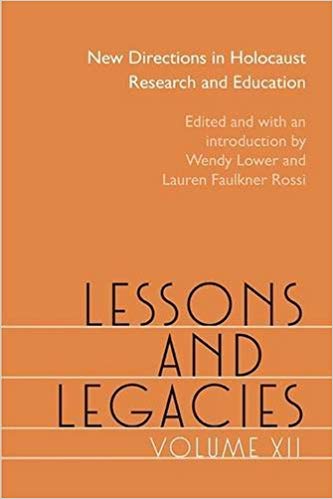German Guilt Diffusion Admitted in UNSERE MUTTER… Lower

Lessons and Legacies XII: New Directions in Holocaust Research and Education, by Wendy Lower and Lauren Faulkner Rossi (eds.) 2017
UNSERE MÜTTER, UNSERE VÄTER Admittedly Shifts Blame Away From Germans and Onto Poles. Holocaust Not Especially “Irrational”. Jan T. Gross Dubious Credibility. Grave Robbery Common
I focus on the relevant information in this volume:
UNSERE MÜTTER, UNSERE VÄTER IS GERMAN GUILT DIFFUSION PER EXCELLENCE
Lukas Meissel is a historian at the ISRAELITISCHE KULTUSGEMEINDE WIEN (Archives of the Jewish Community of Vienna). He candidly writes the following:
“Historical guilt is often talked about or portrayed in a somewhat elusive way; making it easy to relativize. UNSERE MÜTTER, UNSERE VÄTER does this in at least three ways: 1. The Poles are shown as even more anti-Semitic than the Germans. Furthermore, they are presented as convinced ideological anti-Semites, whereas the German characters are portrayed mostly as not ideological. 2. Soviet soldiers are presented in a primarily negative light… 3. In the series, the Americans (and not the Germans) use ‘former’ Nazis to pursue their own interests…” (pp. 418-419).
Meissel continues, “These are three COMMON STEREOTYPES sometimes brought up participants during study trips TO DOWNPLAY NAZI CRIMES. The general argument is that everyone was guilty to some degree and was simultaneously a victim at some point—even if it was only as a ‘victim of the circumstances.’ The common assumption is that individual Germans and Austrians were not responsible for the situations in which they lived and, therefore, cannot be held responsible for what they did personally.” (p. 419. Emphasis added). Well said!
IF KILLING JEWISH LABORERS WAS IRRATIONAL, THEN SO WAS THE GERMAN MURDER OF MILLIONS OF SOVIET POWS THAT COULD HAVE BEEN LABORERS!
One canned argument for Holocaust exceptionality (or Holocaust uniqueness) is that of the Holocaust an “irrational” genocide wherein the perpetrators harmed themselves. (This is supposed to contrast with all the other genocides as “rational” genocides where the perpetrator did not harm himself.). One of the claims of irrationality, as per the Shoah, is the premise that Germans harmed themselves by killing Jews that could have helped the German war effort as forced laborers. However, exactly the same could be said about the systematic German murder of captured mostly-Slavic POWs!
Thus, Itit Gil comments, “The war on the Eastern Front transformed from a BLITZKRIEG (‘lightning war’) into a protracted total war, requiring a huge number of slave laborers to supply the increased demand for armaments. Yet millions of Soviet prisoners of war, who could have served as laborers, were killed or continued to die in German captivity.” (p. 382).
THE HOLOCAUST AND THE POLOKAUST WERE INTERTWINED
Alon Confino writes, “By using comparative genocide studies, scholars have placed the Holocaust within a vast Nazi program of resettlement and extermination that included the genocides not only of Jews but also of Poles, Russians, Ukrainians, and others.” (p. 128).
JAN T. GROSS ADMITS THAT MUCH OF WHAT HE CLAIMS IS OF DUBIOUS CREDIBILITY
Neo-Stalinist Jan T. Gross repeats the litany of accusations of Poles, as a whole, torturing and killing fugitive Jews. However, for once he shows a speck of integrity as he candidly acknowledges that, “Much of the evidence about killings or denunciations of Jews by peasants in the Polish countryside consists of uncorroborated personal testimony from survivors, their relatives, or acquaintances. Typically, the account is brief and notes the fact without many details. Much of it is secondhand information, for example, knowledge sought out and acquired after the fact a concerned family member.” (p. 17). Hearsay!
GRAVE ROBBERY A COMMON WAR-RELATED EVENT, NOT SOMETHING THAT “POLES DID TO JEWS”
Karel C. Berkhoff describes the site of Babi Yar (Babyn Yar), near Kiev, soon after the re-entry of the Red Army. Various presumably-Ukrainian and Russian people looted the dead. They were searching for wedding rings, earrings, gold fillings and bridges, etc. (p. 263). Owing to the fact that a large fraction of the people murdered at Babi Yar had not been Jews, the looters had no way of knowing if they were profaning the body of a Jew or a body of one of their own co-nationals. Yet, oblivious to this consideration, they went ahead and looted anyway.
So much for the myth that Eastern Europeans had some kind of a lust for Jewish property!
To see a series of truncated reviews in a Category click on that Category:
- All reviews
- Anti-Christian Tendencies
- Anti-Polish Trends
- Censorship on Poles and Jews
- Communization of Poland
- Cultural Marxism
- German Guilt Dilution
- Holocaust Industry
- Interwar Polish-Jewish Relations
- Jewish Collaboration
- Jewish Economic Dominance
- Jews Antagonize Poland
- Jews Not Faultless
- Jews' Holocaust Dominates
- Jews' Holocaust Non-Special
- Nazi Crimes and Communist Crimes Were Equal
- Opinion-Forming Anti-Polonism
- Pogrom Mongering
- Poland in World War II
- Polish Jew-Rescue Ingratitude
- Polish Nationalism
- Polish Non-Complicity
- Polish-Ukrainian Relations
- Polokaust
- Premodern Poland
- Recent Polish-Jewish Relations
- The Decadent West
- The Jew as Other
- Understanding Nazi Germany
- Why Jews a "Problem"
- Zydokomuna